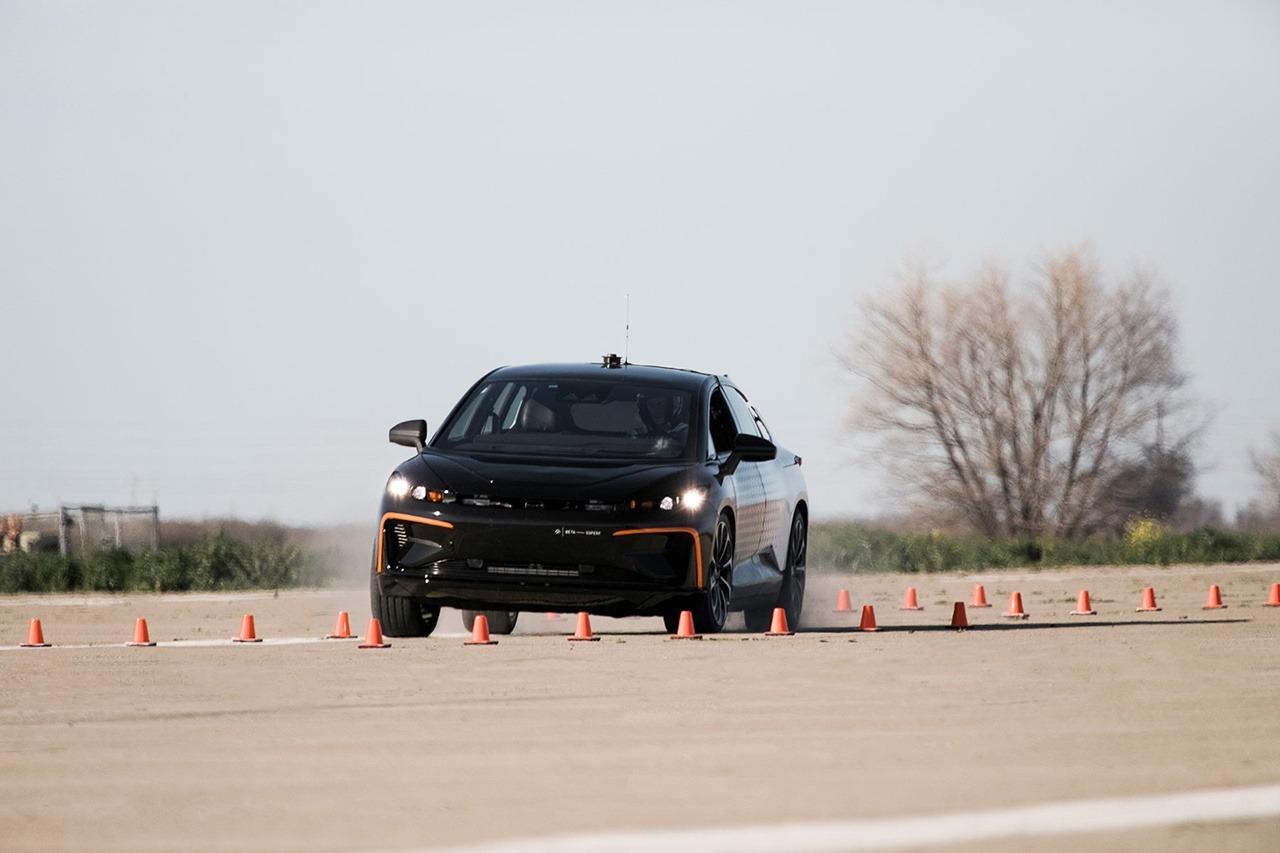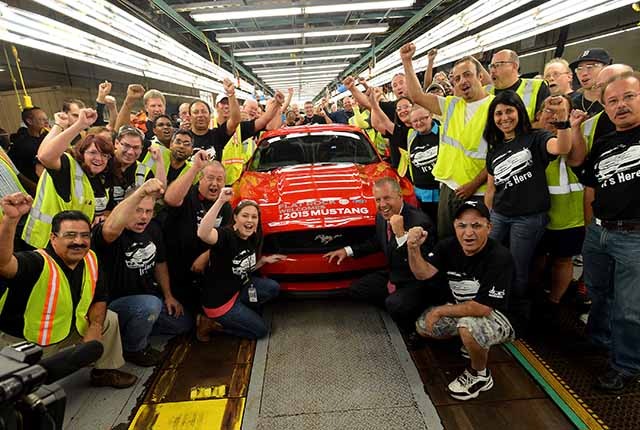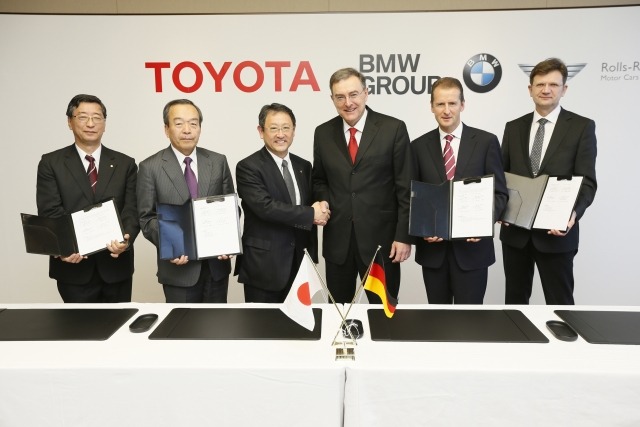Search the Community
Showing results for tags 'agreement'.
-
Towards the end of last year, the fate of Faraday Future looked to be bleak. Their main investor, Chinese company Evergrande Health Industry Group filed a complaint with the Hong Kong Stock Exchange that claimed Faraday tried to cancel a deal to sell a 45 percent stake to them. Evergrande claimed the company didn't meet various milestones to get the full $2 billion it had agreed to in the summer. But Faraday fought back, saying that Evergrade didn't cough up the cash. This would only signal the beginning of various issues. Throughout October, reports started to emerge that Faraday started implementing austerity measures that included a 20 percent cut in salaries and laying off a small group of workers. Later in the month, one of the co-founders of Faraday, Nick Sampson would step down. But there is some good news for Faraday. Earlier this week, Faraday Future announced that it and Evergrade have agreed to a new restructuring agreement. According to a statement, the new agreement will “terminate the previous investment contract, withdraw and waive all litigation and arbitration proceedings, and release all security including the asset preservation pledge and equity financing rights.” This agreement will see Evergrade's stake be reduced from 45 to 32 percent. The agreement also opens the door for Faraday to look for new financing, something the company has badly needed for months. Source: Faraday Future on Twitter View full article
-

Faraday Future Reaches A Truce With Its Main Investor
William Maley posted an article in Automotive Industry
Towards the end of last year, the fate of Faraday Future looked to be bleak. Their main investor, Chinese company Evergrande Health Industry Group filed a complaint with the Hong Kong Stock Exchange that claimed Faraday tried to cancel a deal to sell a 45 percent stake to them. Evergrande claimed the company didn't meet various milestones to get the full $2 billion it had agreed to in the summer. But Faraday fought back, saying that Evergrade didn't cough up the cash. This would only signal the beginning of various issues. Throughout October, reports started to emerge that Faraday started implementing austerity measures that included a 20 percent cut in salaries and laying off a small group of workers. Later in the month, one of the co-founders of Faraday, Nick Sampson would step down. But there is some good news for Faraday. Earlier this week, Faraday Future announced that it and Evergrade have agreed to a new restructuring agreement. According to a statement, the new agreement will “terminate the previous investment contract, withdraw and waive all litigation and arbitration proceedings, and release all security including the asset preservation pledge and equity financing rights.” This agreement will see Evergrade's stake be reduced from 45 to 32 percent. The agreement also opens the door for Faraday to look for new financing, something the company has badly needed for months. Source: Faraday Future on Twitter -

And Ford Makes For Three: Blue Oval and UAW Reach A Tentative Agreement
William Maley posted an article in Ford
The negotiations with the Detroit three seem to be coming to an end as Ford and the UAW announced this afternoon they have reached a tentative contract agreement. “Working with our UAW partners, we have reached a tentative agreement for the next four years for our employees and our business. The agreement, if ratified, will help lead the Ford Motor Company, our employees and our communities into the future,” said John Fleming, Ford executive vice president of global manufacturing and labor affairs. Details of new contract are under wraps as the national council will need to approve. The council will meet next Monday to discuss and give their say on it. According to Automotive News, the contact could resemble the one for GM-UAW workers, which includes a path to the end of a two-tier wage system and a $8,000 signing bonus. “This agreement is significant for our members in that it creates a clear path for economic advancement for active members and rewards veteran employees for their sacrifices in recent years,” UAW Vice President Jimmy Settles said in a statement. “It is one of the richest agreements in the history of UAW-Ford.” Source: Automotive News (Subscription Required) -
The negotiations with the Detroit three seem to be coming to an end as Ford and the UAW announced this afternoon they have reached a tentative contract agreement. “Working with our UAW partners, we have reached a tentative agreement for the next four years for our employees and our business. The agreement, if ratified, will help lead the Ford Motor Company, our employees and our communities into the future,” said John Fleming, Ford executive vice president of global manufacturing and labor affairs. Details of new contract are under wraps as the national council will need to approve. The council will meet next Monday to discuss and give their say on it. According to Automotive News, the contact could resemble the one for GM-UAW workers, which includes a path to the end of a two-tier wage system and a $8,000 signing bonus. “This agreement is significant for our members in that it creates a clear path for economic advancement for active members and rewards veteran employees for their sacrifices in recent years,” UAW Vice President Jimmy Settles said in a statement. “It is one of the richest agreements in the history of UAW-Ford.” Source: Automotive News (Subscription Required) View full article
-
By William Maley January 24, 2013 Today, BMW and Toyota have signed binding agreements on jointly developing hydrogen fuel cell powertrains, a sports car platform, lightweight materials, and a lithium-air battery. The binding agreements finalize a technology partnership that was announced in December 2011. On the fuel cell front, BMW and Toyota will combine their existing resources and knowledge to develop a complete fuel-cell vehicle system; including a fuel stack, hydrogen tank, motor and battery, by 2020. The two companies will also look into the infrastructure needed for hydrogen. Also planned is research into lithium-air batteries which promise five times the energy density of lithium-ion batteries, and lightweight materials - such as carbon fiber - for car bodies. But the one part of the BMW/Toyota agreement that has everyone buzzing is the joint platform for a sportscar. The new platform will be for a mid-size sportscar. The two will do a feasibility study that will be completed by the end of this year. “It is just over a year since we signed our collaborative MoU, and with each day as our relationship strengthens, we feel acutely that we are making steadfast progress. Now, we are entering the phase that promises the fruit. While placing importance on what we learn from the joint development, we will work hard together in reaching our common goal of making ever-better cars,” said Toyota president Akio Toyoda in a statement. Source: BMW, Toyota William Maley is a staff writer for Cheers & Gears. He can be reached at [email protected] you can follow him on twitter at @realmudmonster. Press Release is on Page 2 BMW Group and Toyota Motor Corporation Deepen Collaboration by Signing Binding Agreements Fuel Cell System, Sports Vehicle, Lightweight Technology and Lithium-air Battery Collaboration to Commence Munich, Germany - January 24, 2013... BMW Group and Toyota Motor Corporation (TMC) are pursuing their successful strategic long-term cooperation in the field of sustainable mobility today by signing binding agreements aimed at long-term collaboration between the two companies for the joint development of a fuel cell system, joint development of architecture and components for a sports vehicle, and joint research and development of lightweight technologies. These agreements follow a memorandum of understanding signed in June 2012. Furthermore, BMW Group and TMC also today signed a binding agreement to commence collaborative research on lithium-air batteries, a post-lithium-battery solution. This agreement marks the second phase of collaborative research into next-generation lithium-ion battery cells that commenced in March 2012. The main points of the agreements are: 1. Fuel cell system - The companies are convinced that fuel cell technology is one of the solutions necessary to achieve zero emissions. BMW Group and TMC are to share their technologies and to jointly develop a fundamental fuel-cell vehicle system, including not only a fuel cell stack and system, but also a hydrogen tank, motor and battery, aiming for completion in 2020. - The companies are to collaborate in jointly developing codes and standards for the hydrogen infrastructure which are necessary for the popularization of fuel cell vehicles. 2. Sports vehicle - The companies agreed to set-up a feasibility study to define a joint platform concept for a mid-size sports vehicle that is to be completed by the end of 2013. The two companies aim to combine each other’s technology and knowledge at a high level to maximise customer satisfaction. Both companies are to share the vision to further collaborate in the field of sports vehicle development. 3. Lightweight technology The companies are to jointly develop lightweight technologies for vehicle bodies using cutting-edge materials such as reinforced composites, with an eye to utilize these technologies in cooperation on the joint development of a sports-vehicle platform as well as other BMW and TMC vehicles. 4. Post-lithium-battery technology The companies are to begin joint research with a goal to develop a lithium-air battery with energy density greatly exceeding that of current lithium-ion batteries. Norbert Reithofer, Chairman of the Board of Management of BMW AG said: “TMC and the BMW Group share the same strategic vision of future sustainable mobility. In light of the technological changes ahead, the entire automotive industry faces tremendous challenges, which we also regard as an opportunity. This collaboration is an important building block in keeping both companies on a successful course in the future.” Akio Toyoda, President of TMC said: “It is just over a year since we signed our collaborative MoU, and with each day as our relationship strengthens, we feel acutely that we are making steadfast progress. Now, we are entering the phase that promises the fruit. While placing importance on what we learn from the joint development, we will work hard together in reaching our common goal of making ever-better cars.” BMW Group and TMC first agreed to form a medium-to-long-term collaborative relationship for developing next-generation environment-friendly vehicles and technologies in December 2011, at which time the two companies also signed a contract under which BMW Group is to supply highly efficient diesel engines to Toyota Motor Europe. BMW Group and TMC - as long-term strategic partners - have since continued their joint efforts to realize sustainable mobility for the future. View full article
-
By William Maley January 24, 2013 Today, BMW and Toyota have signed binding agreements on jointly developing hydrogen fuel cell powertrains, a sports car platform, lightweight materials, and a lithium-air battery. The binding agreements finalize a technology partnership that was announced in December 2011. On the fuel cell front, BMW and Toyota will combine their existing resources and knowledge to develop a complete fuel-cell vehicle system; including a fuel stack, hydrogen tank, motor and battery, by 2020. The two companies will also look into the infrastructure needed for hydrogen. Also planned is research into lithium-air batteries which promise five times the energy density of lithium-ion batteries, and lightweight materials - such as carbon fiber - for car bodies. But the one part of the BMW/Toyota agreement that has everyone buzzing is the joint platform for a sportscar. The new platform will be for a mid-size sportscar. The two will do a feasibility study that will be completed by the end of this year. “It is just over a year since we signed our collaborative MoU, and with each day as our relationship strengthens, we feel acutely that we are making steadfast progress. Now, we are entering the phase that promises the fruit. While placing importance on what we learn from the joint development, we will work hard together in reaching our common goal of making ever-better cars,” said Toyota president Akio Toyoda in a statement. Source: BMW, Toyota William Maley is a staff writer for Cheers & Gears. He can be reached at [email protected] you can follow him on twitter at @realmudmonster. Press Release is on Page 2 BMW Group and Toyota Motor Corporation Deepen Collaboration by Signing Binding Agreements Fuel Cell System, Sports Vehicle, Lightweight Technology and Lithium-air Battery Collaboration to Commence Munich, Germany - January 24, 2013... BMW Group and Toyota Motor Corporation (TMC) are pursuing their successful strategic long-term cooperation in the field of sustainable mobility today by signing binding agreements aimed at long-term collaboration between the two companies for the joint development of a fuel cell system, joint development of architecture and components for a sports vehicle, and joint research and development of lightweight technologies. These agreements follow a memorandum of understanding signed in June 2012. Furthermore, BMW Group and TMC also today signed a binding agreement to commence collaborative research on lithium-air batteries, a post-lithium-battery solution. This agreement marks the second phase of collaborative research into next-generation lithium-ion battery cells that commenced in March 2012. The main points of the agreements are: 1. Fuel cell system - The companies are convinced that fuel cell technology is one of the solutions necessary to achieve zero emissions. BMW Group and TMC are to share their technologies and to jointly develop a fundamental fuel-cell vehicle system, including not only a fuel cell stack and system, but also a hydrogen tank, motor and battery, aiming for completion in 2020. - The companies are to collaborate in jointly developing codes and standards for the hydrogen infrastructure which are necessary for the popularization of fuel cell vehicles. 2. Sports vehicle - The companies agreed to set-up a feasibility study to define a joint platform concept for a mid-size sports vehicle that is to be completed by the end of 2013. The two companies aim to combine each other’s technology and knowledge at a high level to maximise customer satisfaction. Both companies are to share the vision to further collaborate in the field of sports vehicle development. 3. Lightweight technology The companies are to jointly develop lightweight technologies for vehicle bodies using cutting-edge materials such as reinforced composites, with an eye to utilize these technologies in cooperation on the joint development of a sports-vehicle platform as well as other BMW and TMC vehicles. 4. Post-lithium-battery technology The companies are to begin joint research with a goal to develop a lithium-air battery with energy density greatly exceeding that of current lithium-ion batteries. Norbert Reithofer, Chairman of the Board of Management of BMW AG said: “TMC and the BMW Group share the same strategic vision of future sustainable mobility. In light of the technological changes ahead, the entire automotive industry faces tremendous challenges, which we also regard as an opportunity. This collaboration is an important building block in keeping both companies on a successful course in the future.” Akio Toyoda, President of TMC said: “It is just over a year since we signed our collaborative MoU, and with each day as our relationship strengthens, we feel acutely that we are making steadfast progress. Now, we are entering the phase that promises the fruit. While placing importance on what we learn from the joint development, we will work hard together in reaching our common goal of making ever-better cars.” BMW Group and TMC first agreed to form a medium-to-long-term collaborative relationship for developing next-generation environment-friendly vehicles and technologies in December 2011, at which time the two companies also signed a contract under which BMW Group is to supply highly efficient diesel engines to Toyota Motor Europe. BMW Group and TMC - as long-term strategic partners - have since continued their joint efforts to realize sustainable mobility for the future.




